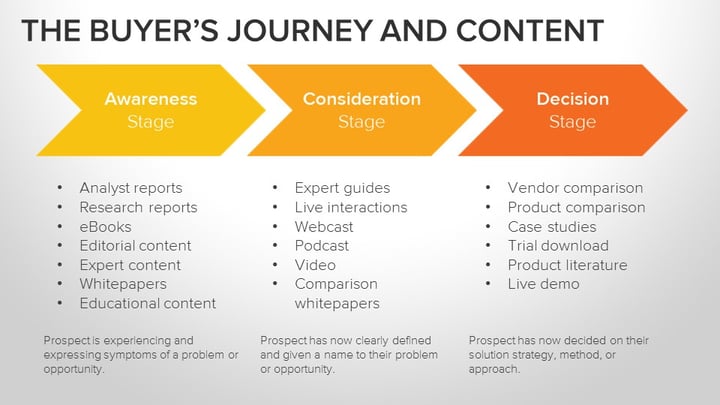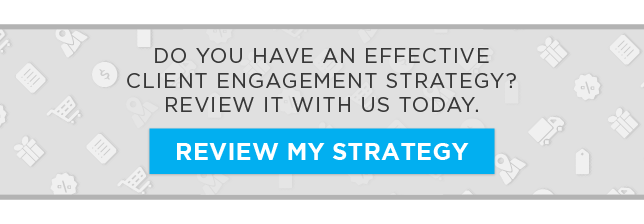 Content marketing. Even if you aren’t clear on all the ins-and-outs of what that phrase means, we are sure you’ve heard of it—and we’re sure you’re wondering why, with all the different types of marketing out there, you should spend any of your valuable time (or money) on content marketing.
Content marketing. Even if you aren’t clear on all the ins-and-outs of what that phrase means, we are sure you’ve heard of it—and we’re sure you’re wondering why, with all the different types of marketing out there, you should spend any of your valuable time (or money) on content marketing.
What is content marketing? What makes it different from randomly generated blog posts and run-of-the-mill social media? What value does your company get out of creating content, and what returns should you expect to see from investing in it?
Let us break it down for you.
Content Marketing: An Overview
According to the Content Marketing Institute, content marketing is:
A strategic marketing approach focused on creating and distributing valuable, relevant, and consistent content to attract and retain a clearly-defined audience — and, ultimately, to drive profitable customer action.
 In other words, content marketing is more than just writing blogs and creating nice videos: it’s providing education, help, and tips that will help your customers connect to your business.
In other words, content marketing is more than just writing blogs and creating nice videos: it’s providing education, help, and tips that will help your customers connect to your business.
The goal of content marketing is to provide your visitors with content that can be shared digitally—from straightforward blogs to white papers, videos, webinars or social posts—in the hopes that they will engage with your business and come to you to solve whatever problem your business or service is there for.
Still, understanding what content marketing is and how it differs from traditional marketing doesn’t prove how valuable for your business—which is why its important to understand the consumer buying cycle, and where content marketing fits in.
Content Marketing & The Buyer's Journey
In order to understand the value of content marketing, you must first understand how people go about making purchasing decisions. When people buy anything, they go through a series of steps that help them decide what it is they want to do—stages we will call: awareness, consideration, and decision.
Stages of the Buyer’s Journey
In the awareness stage, your potential buyer is only just becoming aware of the challenge or opportunity they are looking to pursue—whether that be them realizing they have a cold, or that they want to take flying lessons. In this stage, what your potential buyers are looking for is information—information that gives them a better sense of their challenge, and helps them figure out what the solution to their problem is.
From that point, they enter the consideration stage—where they have clearly defined their problem and are now looking for potential solutions. In this stage, they are learning about different ways to solve their particular dilemma: either considering different doctors or medicines (in the case of our customer with a cold) or researching different pilot credentialing programs in the area (for our customer looking to fly).
The decision stage that follows directly after that is exactly what it sounds like: your customer is looking at making a decision about the solution they want to pursue, and is doing research to validate their final decision as well as figure out what it is going to take to get them there.
Understanding what customers are looking for in each stage is the foundation of what makes content marketing important—especially given that content marketing exists to provide relevant, valuable content to potential customers.
Content and the Buyer’s Journey
Essentially, the value of content marketing for your business lives in the way it goes about addressing the needs of your potential customers in every part of the buyer’s journey. Whether that be offering them educational, editorial and expert content when they are just becoming aware of their problem; providing expert guides, podcasts or comparison whitepapers as they consider different ways to solve their now clear dilemma; or offering trials, vendor comparisons, live demos or product literature, creating content to meet your potential customers in the decision making process is what makes it valuable to your company.

Content marketing gives you an opportunity to prove your value to your consumers even before they make a purchase—and to become a reliable source of information even if they don’t buy something from you the first time around. In this way, content marketing is as valuable for all kinds of companies as traditional marketing is—only it helps forge a connection based on not just potential commerce, but a relationship based in trust and human connection.
The Benefits of Content Marketing
Of course, content marketing wouldn't be valuable if you didn't see a return on your investment. Here are some of the benefits you can expect from an effective content marketing strategy, once you've implimented it:
1: Increased Site Traffic
One of the things that makes content marketing so valuable is that it brings traffic to your website. Content, especially when built around effective keyword and SEO strategy, is useful for drawing people to your website and your services—and for building your credibility on Google. One of the big goals of content marketing is to build up your digital footprint so people find you more readily in search engines—which will only happen if you spend time creating valuable content to put there.
SEE ALSO: Are SEO Services a Waste of Money?
2: Increased brand awareness
Content marketing, on top of helping to bring more exposure to your website and service, is great for promoting your reputation as a company and brand. Because content marketing is centered around building relationships with your consumers, there is an added benefit of promoting your culture and helping your target market think of your company whenever they need to buy what it is you offer.
SEE ALSO: Simple Guidelines for Establishing Your Brand Identity
3: Increased credibility as an expert source
The primary reason why you create high quality content for your audience isn't just to fill up the internet with reasons to look at your website—it is to prove that you know what it is you are talking about. Failing to create good content that solves your customer's questions isn't maximizing the value of content marketing as a whole—which is why you want to create valuable content that proves your expertise in whatever arena your business serves.
4: Improved customer relationships
All good relationships start with one thing: conversation. By building content that inspires an ongoing conversation with your potential consumers, you are creating a bond between you and them that facilitates trust—something that will not only draw people to your business when it comes time for them to make a purchase, but that builds an ongoing relationship with them even afterward.
SEE ALSO: Personalization as a Marketing Strategy
Final Thoughts
As you can see, creating an effective content marketing strategy for your business has major ongoing benefits—benefits that will only become more useful the more technologically involved commerce and marketing becomes. If you are in need of someone to help you through building a better marketing strategy and campaign, let us know: we are here to help.


